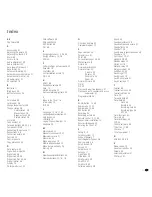
69 -
E
Electronic Programme Guide:
See
EPG
.
EPG:
Electronic Programme Guide is the electronic variant of a printed
television programme guide. Using the EPG you can watch the TV
programme of the TV stations which transfer the appropriate data. The
overview of the programmes contains the title, beginning and end and
the duration of the programme. In addition also a brief description of
respective content of the programme is displayed.
Euro AV socket:
Interface for connecting video devices to a TV set. This
socket is also referred to as Scart socket.
F
FLOF:
Full Level One Facilities. Teletext system in which names and
numbers of the jump destinations are transmitted in the bottom line
on every page. This guides the reader to related topics for example. An
information about which pages exist and which pages have sub-pages
is not available in FLOF.
H
HDCP:
High-bandwidth Digital Content Protection. Coding system pro-
vided for the
DVI
and
HDMI
interfaces for secure transmission of audio
and video data.
HDMI:
High Definition Multimedia Interface is a newly developed interface
for full digital transmission of audio and video data.
HDTV:
High Definition Television is an umbrella term that covers a number
of high resolution television standards.
HD-Ready:
A quality seal that is awarded to products that are capable of
displaying high-definition television (
HDTV
).
High band and Low band:
Transmission ranges for satellites.
J
JPEG/JPG:
Joint Photographic Experts Group is a committee which has
developed a standard method for the compression of digital photos. This
method JPEG (
JPG
for short), named after the committee, is a commonly
used graphic format for photos.
L
LCD:
Liquid Crystal Display.
LCN:
Logical Channel Numbers. In stations with LCN, the channel loca-
tion number belonging to the station is also transmitted by the provider.
The stations are sorted according to these channel location numbers.
L-Link:
Intelligent system connection between Loewe devices for the
automatic exchange of information. Makes the operation of TV and
Loewe system components even more convenient.
LNB/LNC:
The crucial electronic component of a satellite antenna is
referred to as an LNB (Low Noise Block Converter). It is mounted in the
focal point of a parabolic antenna. The designation
LNC
(Low Noise
Converter) indicates that conversion to lower intermediate frequency
takes place. The supplemental block in the LNB refers to the fact that a
whole frequency range (a block) is converted in each case.
M
MHEG-5:
Digital teletext standard of the Multimedia and Hypermedia Ex-
pert Group. At the moment only available in United Kingdom and Ireland.
Modulator:
Transmitter in the video or DVD recorder so that the devices
can receive signals via the tuner of the TV device.
Mono:
Single-channel audio.
MPEG:
Digital compression process for video.
N
Network ID:
NID refers to the so-called programme ID number, also known
as network ID – a number between 0 and 8191. This specification is
necessary in specific cable networks of some countries. Then only DVB
signals of this station network are searched for.
NICAM:
Audio standard. Is used in Denmark, England, France, Sweden,
and Spain.
NTSC:
American colour standard.
P
Page Catching:
For teletext, refers to going to and calling a page number.
PAL:
European standard.
PCM:
Pulse Code Modulation for digital sound.
Picture in Picture:
See
PIP
.
PIP:
Picture in Picture; a function which displays two pictures on the
screen.
Pixel:
Denotes both the smallest unit of a digital graphic grid and its
display on a screen with grid control.
Pixel error:
A pixel error is a defective pixel, usually on an LCD. Pixel errors
may be caused by production errors. They are expressed for example by
a constantly lit pixel or a constantly black pixel. Single defective pixels
however are excluded from a guarantee.
Progressive JPEG:
Progressive
JPEG
s are built up gradually. The quality of
the picture increases progressively during the loading process.
ProScan/Progressive Scan:
Progressive Scan (abbr. PS) or full picture
method is a technique in the picture build-up of monitors, TV sets,
beamers, and other display devices in which the output device is not
sent line interlaced half pictures – unlike in the interlace technique – but
real full pictures.
Glossary




































